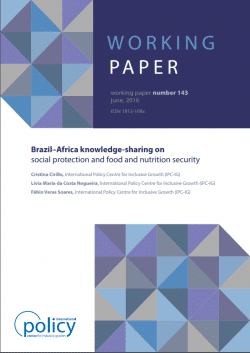
Policy highlights:
- As Brazil’s social protection and food security policies have been identified as a successful experience, knowledge exchange with African countries has increased since the late 1990s with some positive results for African countries.
- It has stimulated confidence in the role of cash transfers to reduce poverty and promote education, and has bolstered the commitment of African leaders to strengthen social protection systems.
- African participants recognize the importance of coordinated interventions through centralized databases, regulations and the involvement of high-level government institutions.
- However, in only a few cases did the Brazil–African initiatives result in structured or formalized long-term cooperation.
- To encourage more effective knowledge exchange policymakers should invest in: 1) a sound legal framework for international cooperation; 2) more human capacity to take on the workload; 3) more financial capacity to cover the costs of technical assistance and program implementation; 4) better adjustment of the Brazilian example to the African social and economic context.






